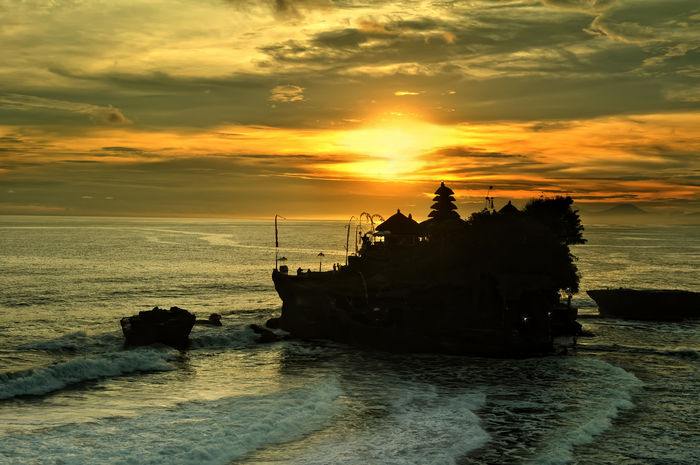Is Indonesia an easy country to travel in?
In general, it is. The country is very cheap, its people are exceptionally friendly, the transport options are plentiful (if a little slow) and limited English is widely spoken. Unsurprisingly, travel is easiest in the most visited areas of Bali, Lombok and, to an extent, in Java. In Bali almost everybody speaks a fair amount of English and travel is the easiest in the archipelago. At the opposite end of the scale, travelling in the more remote parts of the country, such as Maluku and Papua, is significantly more difficult, but potentially more rewarding for the seasoned traveler.
Is it safe? What about for women?
In the main, Indonesia is a safe country. Although violent crime is rare, in some of the tourist areas pickpocketing and small scale scams are a fairly common occurrence. If you use your common sense and keep an eye on your belongings when in crowds you should avoid any of these problems. Plenty of women travel in Indonesia by themselves or with others and experience few problems. However, as a western female you will receive extra attention from the Indonesian men. This attention sometimes takes the form of being sincerely complemented by waiters, tour guides etc. but can also be less desirable in the form of horn-honking, wolf-whistling and shouts. The best ways to avoid, (or at least lessen), this attention is to dress conservatively and/or consider travelling around with a male companion.
How severe is the terrorist threat? How have the Bali bombings affected the country?
Indonesia is a much less dangerous country than people imagine. Police have clamped down severely on the perpetrators of the Bali bombings, and have increased spending on anti-terrorist measures. As tourism is one of Indonesians main industries is definitely within the interests of the authorities to extinguish the terrorist groups. Although safety cannot be absolutely guaranteed within the country, you are extremely unlikely to encounter any problems. The main effect of the Bali bombings has been its effect on tourism. Visitors to the region dramatically decreased in the months following the troubles. Although tourism is beginning to revive in the country, many places are significantly quieter than they used to be. This means that some of the most stunning attractions in the country are eerily quiet. Make the most of it.
Are there any areas that should be avoided?
There are areas of the country that are experiencing political strife that should try to avoid. However, these are all more remote areas of the country that you would not stumble upon accidentally in your travels and therefore should not affect most visitors. Areas of unrest include the Aceh province of northern Sumatra, Ambon in Maluku and parts of central Sulawesi. Although violence is not an everyday occurrence in these areas, it is more likely than in the rest of the country. If you decide to travel in these areas, it is best to check with the advice of your foreign office and ask around locally for up to date information before visiting.
What is the weather like? What time is the sunset?
Northern Indonesia has an equatorial climate meaning it is mainly warm and wet. Temperatures in the lower areas average about 28ºC/82ºF. As the island are volcanic, large areas are well above sea level and are correspondingly a couple of degrees cooler. In the south of the archipelago (Java, Bali, Lombok, Flores etc.) temperatures are similar but precipitation is less. On the beach island destinations it is almost always sunny and hot. The sun rises around 6am and sets quite rapidly around 6pm.
What time is checkout in hotels in Indonesia?
Checkout time is generally at 12 noon. Most guest houses will charge a surcharge of up to 50% for checkouts between noon and 8pm. After this time, you will have to pay the full cost of the room for the night.
What kind of entertainment and nightlife is there?
Entertainment ranges from cinemas to puppet shows, from nightclubs to traditional ballets. Entertainment facilities are obviously most extensive in the big cities such as Jakarta, but are fairly extensive elsewhere. Although Indonesia is Islamic, bars and nightclubs are a fairly common sight. Jakarta is the home of several large nightclubs which range from the height of class to the depths of sleaze.
Where is the best place to see traditional entertainments?
Probably the best places for these performances will be the most touristy areas. Yogyakarta is famous for its performing arts, with regular performances of Javanese ballets and leather and wooden puppet shows (the longest of which lasts a mammoth 8 hours). These performances can all be seen in Bali also, with the addition of Balinese gamelan music. Ubud in south central Bali is one of the best places for these performances.
What scams should I look out for?
As a westerner you are likely to experience small scale 'scams' most of the time, in that you will rarely pay the same price as a local for goods or services. It is difficult to define when this overcharging becomes a scam but there are plenty of instances of it to be found. Yogayakartahas an abundance of batik salespeople. These people can often be very subtle, pretending to be an instant friend, taking you on a tour of the local attractions and then leading you to several batik shops for an extremely hard sell for hugely inflated prices. Another well known scam is being invited to a locals house, and then being persuaded to play cards where you always lose a large amount of money. The best advice in all these circumstances is to use your common sense. You will quickly get a sense of who is being genuinely friendly and who has an ulterior motive in talking to you. If you don't like the situation you find yourself in, get out of it.
What sort of food do Indonesians eat? Is it good?
Of all the thousands of reasons to visit Indonesia, the food is not likely to be one. The basic diet includes many foods that are designed to fill you up cheaply, but are not always tasty. Staples of the Indonesian diet include rice, noodles, chicken, and fish. These are prepared in a variety of ways; usually either fried or boiled and served in a soup. Dishes such as nasi/mie goreng (fried rice/noodles with spices and vegetables), sotoayam (chicken and noodle soup), and ayam goreng (fried chicken) are the usual types of dishes served at warung. Food also tends to be fairly (or very) sweet or conversely, quite spicy. Having said this however, standards of food can be extremely good when eating at more upmarket restaurants. Specialities such as bebek betutu (duck stuffed with spices and cooked in coconut husks and banana leaves) and Sate (skewered marinated chicken served with spicy peanut sauce) are extremely tasty. Eating at good restaurants as opposed to warung will probably be about 3 times more expensive, but still only cost around 30,000 Rp ($3). Western food can be found in abundance in areas where tourism is greatest and also in the form of fast food restaurants in larger towns/cities. Ubud in southern-central Bali has an extensive range of exceptionally good and fairly cheap western food.
Can I buy camera films there or will I need to take some with me?
All popular types of film are widely available in Indonesia, so there's no need to take lots with you. It's likely to be cheaper in Indonesia too.
Is it a good idea to develop films in Indonesia?
Photo developing labs are all over Indonesia and elsewhere, and will generally produce decent but unspectacular prints. If you have special requirements or your photos are particularly important, you might be better to save it until you get home but the ones in Indonesia are fine for the average set of holiday snaps.
What is the quality and availability of health care and medicines like?
Medical care is at its peak in Jakarta but may not be very good if you get well off the beaten track. The best bets for treatment in these areas are Catholic or missionary hospitals and clinics. In the towns and cities it is fairly easy to locate doctors and dentists. The best ways to find them are to ask hotels, embassies or at large companies. Most hospitals have English speaking staff.
Pharmacies are widespread but take care when using them. Many drugs can be obtained here without prescription and they are not always in the best condition. Ensure you check expiry dates on drugs before taking them as they may well be out of date.
What is the time difference in Indonesia?
Indonesia has three different time zones. These are as follows:
Western Indonesian Time = GMT+7 (Java, Sumatra, West and Central Kalimantan) Central Indonesian Time = GMT+8 (Bali, Nusa Tenggara, Sulawesi, South and East Kalimantan) Eastern Indonesian Time = GMT+9 (Papua and Maluku)
Indonesia has no daylight savings time adjustments (due to its equatorial position), but remember to adjust for your own countries adjustments in the summer months.
What is the best way to get around the archipelago?
The best value option for long distance transport is the train lines. These are comfortable, reliable and efficient. They also have the bonus of avoiding traffic (which lengthens bus journeys by about a couple of hours), meaning that they stick to their timetable. There are 3 different classes of travel available so the price is also flexible to your budget. Unfortunately, the areas which are serviced by train are fairly limited. Java has the best coverage, with train lines running through the north and south of the island. If you are trying to get from north to south (or vice versa), bus is probably the way to do it.
Public buses are very cheap in Indonesia but are typically quite slow. They will make countless stops to pick up other passengers and are obviously affected by the prolific traffic jams in the country. They can often be extremely cramped and rather bumpy. However, they can be quite an enjoyable experience for shorter trips as your companions will doubtless include not only people but also assorted livestock accompanied by be locals who rarely see tourists and will be fascinated by you. For long distance journeys not served by train, it is probably worth paying the extra money to get an overnight luxury bus. These run between the majority of popular destinations (Jakarta, Yogyakarta, Denpasar etc.) and are very comfortable. There is more leg room, the seats recline, and you get blankets and food and drink included in the price. A 14hour journey on one of these buses will cost a relatively expensive 120,000 Rp, but it does mean you get a good nights sleep.
There are plenty of private transport companies which are often used by visitors, but these are generally by far the worst option for getting about. They are around the same price as the public buses, but often operate cramped, uncomfortable minibuses and suicidal drivers. This is especially the cases of the companies located in very touristy areas as they don't need to rely on return business.
If your budget will allow it, internal flights are another option for getting around the country. Indonesia is served by a fairly comprehensive internal flight network flown by a number of local companies. These are more expensive still, but are the quickest way to get around. A flight from Yogyakarta to Denpasar for example, will cost around 480,000 Rp (compared to a luxury overnight bus at 120,000). It is normally possible to book on the day (if not day before) of travel and still get a seat.
How easy/safe is it to rent a motorbike or car?
For most people, hiring a car and driving yourself about in Java would be little short of a nightmare. The traffic is very bad, roads are poorly signed and some of the driving standards exhibited are questionable to say the least. Hiring a car with a driver or using taxis tends to be a much better idea.
In Bali and Lombok, hiring a car can be a good and relatively cheap way of getting about. Hiring a car with a driver/guide is marginally more expensive, but is perhaps a better idea as it will mean avoiding all the problems associated with driving yourself about. Avis, Hertz and other international car hire agencies are well represented, but there are also many local companies about. The local companies are always cheaper, but have the disadvantage that the cars may not be properly insured (even if they tell you otherwise). Your insurance from home might not cover being involved in an accident from renting a car/motorbike, so it's worth checking that before you leave.
One way rental is a possibility with bigger companies but expect it to cost a lot more. It's a good idea to always fill up the tank before you bring the car back too, as petrol is cheap and the fee you would otherwise be charged is expensive.
You are almost always asked to leave your passport as a deposit for any vehicle that you want to rent, but there is obviously a risk in doing this. If you negotiate, some places will let you leave travellers cheques or cash instead (local hire firms are generally more flexible than international ones). Bear in mind that if you have any sort of problem and have left your passport, you will be in a very weak position when it comes to negotiating how much the damage costs. Your embassy and/or the police may be able to help you, but don't count on it.
Check a vehicle thoroughly before hiring it as they are not always in pristine condition, particularly the cheaper ones. Point out any existing damage or scratches before you hire, or don't be surprised when they try to charge you for them later.
Most of the roads and highways are in good condition, and have two or three lanes on each side. Passing on blind corners is not uncommon. Buy a decent road map before you set off, and don't forget that Indonesians drive on the left! Driving at night is not a good idea, as it can be impossible to find your way on the not too well signposted roads.
Hiring a motorbike is also possible, but even more risky than hiring a car. If you are not an experienced rider, Indonesia is not the place to learn. Highways are busy, fast paced and driving conditions extremely unpredictable. This goes double around the Yogyakarta area where accidents are very common (the Yogyakarta-Solo highway is the most dangerous road in Indonesia). Most towns and islands have good local transport, which is cheap and abundant. This may be a better option than involving yourself with the stress and dangers of driving.
If you have to misfortune to get into an accident, as a foreigner it's likely to be judged as your fault (even if it wasn't) and you will be expected to pay for any damage caused (to vehicles and people) there and then. If someone is injured, the asking amount will be increased to cover the treatment costs - these amounts are definitely up for negotiation, strange as it may seem. Any serious injuries and deaths will definitely involve the police being called - you may still be able to get out of trouble by paying enough money, but it's not certain.
If you plan on driving in Indonesia, bring both an international driving license and your home driving license. You won't (usually) be asked for either of them by the renting companies, but having both will likely be a great help should you happen to get into any legal difficulties.
Is it safe to take luggage on an overnight bus/train?
Theft is fairly rare on overnight transport. When travelling by train, all luggage will be inside the carriage with you, probably within your sight. On overnight buses luggage is locked in compartments underneath the seating areas so no-one can get to luggage during the journey. On buses, be aware that thieves have been known to take the seat behind you, cut your bag and take your belongings before you realise it. This sort of theft is most common on local day buses, but it does happen on more upmarket transport too. Keep an eye on your belongings and you should be fine.
Do I need to make bus/train reservations before I travel?
For
the long-distance buses, you can turn up at the bus station at pretty much any
time. Chances are that the bus you want will be leaving within half an hour, and
will have free seats. Same day reservations are often obtainable for trains, but
during busier tourist periods (July and August) you may need to book a couple of
days in advance. Train reservations can be made directly at the station; some
travel agents also offer this service.
What are the boats to the Islands like?
If travelling to large islands like Bali, a number of large ferry services operate to other islands in the vicinity. If you go to some of the smaller islands (e.g. The Gili islands off northern Lombok), boats are much smaller and a bit rickety. In good weather they are fine, but in rough weather the ride can be a bit turbulent. Some of the islands further off the main land are inaccessible at some times of the year due to storms. Ask locally before attempting to travel.
How safe are Indonesian domestic flights?
Safety on Indonesian domestic flights obviously cannot compare to large international operators, but generally is still pretty good. Garuda Indonesia's (who run the majority of internal flights) safety record is comparable to other operators in the region, with only a handful of accidents in the past 30 years. You may often feel safer flying in order to avoid the questionable driving standards on much of Indonesia's roads!
How much time should I spend there?
The longer you spend in the country, the more you will get out of it. As it is so vast, it would be easy to spend years there and not see all it has to offer. If you are planning a 2-3 week trip, it is probably best to stick to Bali as the island has more than enough to offer for that length of time. If you are staying around 4 weeks you would have time to also visit Lombok and the Gili Islands (or take a 5 day boat trip to the Komodo Islands and back). A minimum of 6 weeks is needed to see Java, Bali and Lombok and this will still be fairly rushed. The distance you need to cover is huge and Indonesian transport can be painfully slow at times. Try not to pack in too much into your schedule as you will spend several nights in commuter towns and won't have enough time to savor the attractions of the country. You can save a fair bit of time if you take the convenient, but more expensive, option of domestic flights around the country.
What time of year is best to go?
Depending on which area of the country you visit, the wet season runs from about October to April. However, in many areas it is often very difficult to tell the difference between the two seasons and your travel may be unaffected. If you were wanting to visit some of the more remote islands in the wet season, you may find it very difficult or impossible. Storms off the islands can be pretty violent and so boats do not run.In the dry season this is not an issue.
The peak tourist season runs from early July to mid-September and again around the Christmas period. In the more touristy areas (mainly Bali), rooms can be fully booked around these times so you may need to book ahead. Visiting in the dry season will mean better weather and more facilities/transport, but it will be more crowded. Due to the fall in tourism this isn't too much of a problem now, but will become increasingly so as tourism picks up.
Whats it like in rainy season? Do I need to bring anything extra?
The rainy season is fairly minor its impact (in most the country). If it does rain, it tends to be in a tropical downpour and then be dry and sunny for the rest of the day. In some areas of the country (e.g. Nusa Tenggara), the wet season is more pronounced and it has been known for rain storms to last for days! This is a rarity however, and for the majority of the country the rainy season is fairly un-noticeable and should affect you very little.








Comments